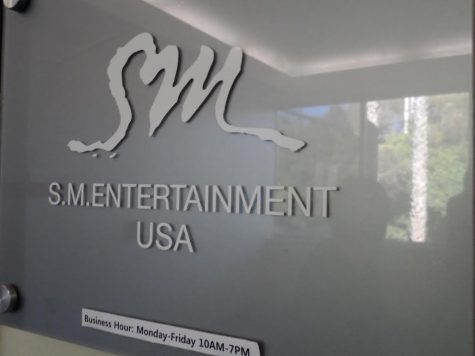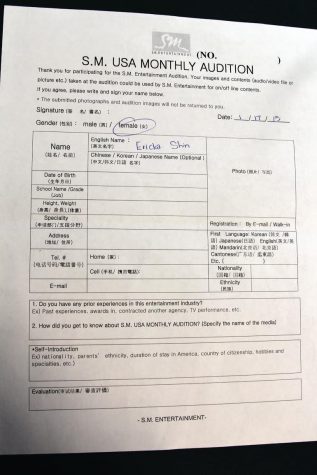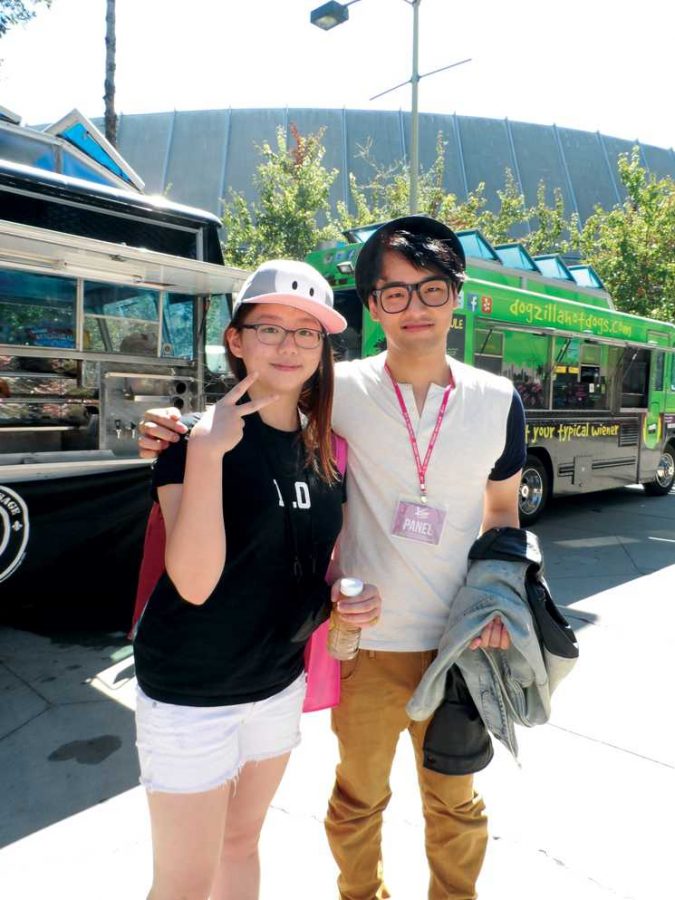Appreciating the K-pop audition
Thousands of hopefuls flock to auditions to become global Korean pop stars
January 21, 2015
photo taken by Vanessa Codilla
K-pop stars like Hee Jun Han serve as an inspiration for Ericka Shin and many other people who dream of becoming K-pop stars themselves.
Korean pop, or K-pop, has taken the world by storm with its boy bands clad in tight, shiny pants and girl groups with impressively long legs. As if all of the members are part of one ethereal organism, they flawlessly execute dance moves together and harmonize in all the right pitches.
These seemingly perfect units, however, are not entirely organic because K-pop groups rely heavily on the investments and precise planning of the industry’s companies. As ABC News reporter Akiko Fujita says in the news segment “K-pop Boot Camp,” “…these groups aren’t born, so much as built.”
While each K-pop company is known for looking for something a little different, the components of this rigorous system are essentially the same. First, there are multiple rounds of auditions for a coveted spot at the company of one’s choice. Then there is a contract, followed by endless amounts of practicing: singing practice, dance practice, language practice and media / PR practice.
The end result? No one knows. Even after all the sweat, blood and tears of these already-talented individuals, there remains a considerable amount of uncertainty as to their fates. According to a 2012 interview with Korean news site Dispatch, Suho of super group EXO was a trainee for seven years and felt that it was “a long time to wait.”
Clark Magnet senior Christine Lee, who is a K-pop fan herself, said there are benefits and drawbacks to the system. “I think it all depends on where you stand,” Lee said. “If it’s your dream, then it’s a great opportunity. But if you aren’t, then you’re going to think it’s just a waste of time to be a trainee for several years without a guarantee of being a K-pop idol.”
On Sat., Jan. 17, to delve into the minds of the hopeful youths who give up so much to become global K-pop stars, I tried out for S.M. Entertainment USA’s Monthly Auditions. S.M. Entertainment is responsible for some of K-pop’s biggest names, including EXO, Girls’ Generation, Super Junior and BoA.

A small, modest gray sign greets K-pop star hopefuls who go to S.M. Entertainment’s Los Angeles office.
This first step to Korean superstardom is not easy. Even emotions that are typical for a performance in front of others can make or break a potential contract. In 2012, Lina Hung, a current freshman at the University of the Pacific and my close friend, tried out as a singer for Pledis Entertainment, home to groups like After School and NU’EST. “I passed through the first round, which was just sending in a picture and application form,” Hung said. “But in the second round, the judge said I was too nervous, and I was dropped.”
Physical appearance can play just as big a part in an industry that comes from a culture that values long, thin limbs and a flat stomach. Another close friend and a fit dancer of 13 years, Nini Buu of John F. Kennedy Middle College High School, auditioned as a dancer in S.M. Entertainment’s 2012 Global Audition, and made it to the third round. “But they told me that I had to lose weight to get in,” Buu said. “They said I would have to lose ten to fifteen pounds within two weeks to get in.”
Listening to the feedback that my talented friends got, I wondered how K-pop stars emotionally and physically survived the auditions, let alone the entire training process. “It’s very tedious,” Hung said.
To prepare to audition as a singer, I consulted with the SMTOWN audition page and my friend, freshman Juslyn Rollan of Eastlake High School, who already has a number of fans from her song covers on YouTube. An avid singer, Rollan has auditioned for S.M. Entertainment twice and once for Cube Entertainment, which has trained groups like 4MINUTE, BEAST and BTOB. “Prepare two or three songs, in English and Korean,” said Rollan. “And of course, a dance routine, because they usually ask you to sing and dance in an audition.”
Preparing during the entire week before the audition, I tried singing various songs all over my house. I found that Lana Del Rey’s songs were best suited for my voice. Unfortunately, I felt that this was too dark for a genre that is reminiscent of bubble gum and puppies.
Therefore, I tried singing something more upbeat and in Korean, such as Girls’ Generation’s “Gee,” Apink’s “Luv” and IU’s “Marshmallow,” ideal songs for any girl trying to join the Korean music industry. But sweetly singing those high notes strained my vocal cords, so I abandoned that idea within two days.
I tried the the powerhouse vocal approach with “A Little Party Never Killed Nobody (All We Got)” by Fergie, Q-Tip and GoonRock, “Flawless” by Beyoncé and “U&I” by Ailee, but I nearly popped a vein in my eye trying to emulate their voices.

The first step to auditioning is filling out a simple form to give the judge an idea of who you are.
By Thursday, I was in despair and slightly resented the whole K-pop system. I am not drop-dead gorgeous, an especially gifted singer or a coordinated dancer. But as Buu said, “All you need is a catchy hook and you’re good.” It was baffling that something that seems fun and easy on-screen could be so difficult in reality.
After sleeping on the thought, I woke up on Friday, resolving to do whatever I felt most comfortable doing once I got there. I felt that I was overthinking the whole process and that I should just go with the flow. I had no particular expectations, and the absence of the burden actually made me sing better than I could have thought possible.
On the afternoon of Jan. 17, wearing a simple sweatshirt and jeans, I finally walked into the nondescript building in Los Angeles that housed S.M. Entertainment USA’s office on the third floor. I threw open the wooden door and strutted to the reception desk, popping my gum along the way, to grab the obligatory walk-in application. My bravado was not meant to intimidate my fellow auditioners; I only wanted to stand out as spunky.
After filling out my application, I flitted in and out of the waiting room to talk to my parents about where they should wait. I did not want them in the waiting room with me because as confident as I seemed, I could not help but be a little embarrassed at the prospect of singing when I was with people I already knew.
Right before my fifth trip out the door I heard the first group start to be called. I held my breath, hoping that I would not be next because as much as I wanted to make a statement, the idea of performing in front of others is daunting. But as fate would have it, I was the last one to be called for the first group.
The receptionist ushered my group behind a wall and led us into a spacious room with the judge in a chair, a plastic table, a metal trash can, a video camera, a stereo, a leather sofa and wooden floors. Two adjacent walls were taken up by mirrors, while the other adjacent sides were white plaster. Along the length of the plastered side of the wall ran a collage of all the S.M. Entertainment artists, which served as our background.
My group consisted of only two Koreans, including myself. Meanwhile, the rest of the auditioners were of various ethnic backgrounds. Of the five of us, four were girls and one was a boy. We stood in a cluster by the leather sofa, as the judge called us one by one to give us a badge with an identifying number. I was called forth and given the number 15-005: 15 for the year, 005 for the number. While the others had been quiet, I uttered a polite “thank you.” Once I had attached the number onto my shirt, we were made to line up along a blue line of tape that ran alongside the length of the collage.
The judge was surprisingly soft-spoken and sympathetic. In English, she explained that we were the first batch of the new year, and reminded us that our faces and numbers had to be seen at all times. “As soon as I give the sign, say your name, age, school, and what you’re going to be doing,” she said. “Is anyone singing?” My whole group raised our hands, and we all gave each other side-long glances of amusement. “Okay, great! Just sing once you’re done with your intro. Fifteen seconds, or the chorus, would be ideal.”
After a pause, during which the air conditioner came on with a loud thump, she asked, “Does anyone know Korean?” This time, I was the only one to raise my hand, and she told me do the introduction in Korean as well as English.
The first singer started off the process. Listening to them introduce themselves, I found the youngest was fourteen years old while the oldest was eighteen. The boy sang Chen’s “Best Luck,” while the rest of us sang songs in English.

All auditioners get a sticker with their assigned number for identification purposes. Ericka Shin’s number was 005, and the 15 refers to the year.
When it was my turn, I said, “Hello, my name is Ericka Shin. I’m 17 years old, and I go to Clark Magnet High School. My number is 005 and I will be singing today,” and repeated the same in Korean. Taking a deep breath, I launched into the chorus of Lana Del Rey’s “Born to Die.” It might not be what they were used to, but I hoped that the shock value of something besides pop music could be my outstanding charm.
And maybe it worked. Despite two bouts of choking on air, the judge asked only the youngest girl of the group and me if we had any previous experience. I said that I had placed in the top three for “KCON’s Got Talent,” and she seemed impressed. Maybe my meager performance actually meant something.
The audition was followed by a mandatory rhythm test, in which the five of us clapped along to a clip of Britney Spears’ “3.”
We were then told that she would evaluate the video tapes once more, send them to Korea, and we would be notified within 60 days. She looked at us apologetically as she mentioned how the company was in utter chaos with the leave of former EXO members Luhan and Kris. Then, we were free to go.
That was it. The experience took all of 20 minutes. Walking out of the office, I was surprised to think that those 20 minutes could determine someone’s future or validate their talent. So much could happen in a short amount of time.
For instance, I suddenly found myself congratulating and cheering on the strangers from my group while in the packed elevator with them. An hour before the audition, I could not have imagined that I would be trying to befriend my competitors.
I cannot say for certain whether I made it or not. I will find out with a response, or lack thereof, in two months’ time. In the crowd of millions of talented singers, I doubt that an amateur like myself could actually be picked out to mount the stage alongside my favorite K-pop groups.
However, that does not mean that I or any other hopefuls should give up. “Look at Kim Sunggyu from Infinite,” said Rollan. “He auditioned for S.M. Entertainment before and did not get accepted but look at him now. He’s the leader of the famous K-pop group Infinite, and one of the main and lead singers of the group.”
